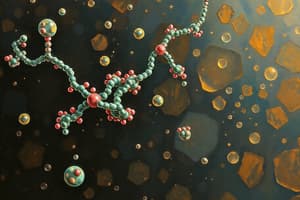Podcast
Questions and Answers
Which of the following is classified as an essential amino acid?
Which of the following is classified as an essential amino acid?
- Asparagine
- Cysteine
- Glycine
- Lysine (correct)
What is a significant biological role of histidine?
What is a significant biological role of histidine?
- It acts as a neurotransmitter in the brain.
- It aids in synthesizing histamine, a chemical messenger. (correct)
- It regulates carbohydrate metabolism.
- It is involved in muscle contractions.
Which of the following amino acids contains sulfur?
Which of the following amino acids contains sulfur?
- Methionine (correct)
- Glutamine
- Isoleucine
- Tyrosine
What is true about the ionization state of amino acids?
What is true about the ionization state of amino acids?
Which amino acid is a precursor for catecholamines like dopamine?
Which amino acid is a precursor for catecholamines like dopamine?
Which of the following amino acids is considered non-essential?
Which of the following amino acids is considered non-essential?
What is the isoelectric point (pI) of glutamic acid?
What is the isoelectric point (pI) of glutamic acid?
Which amino acid has a net charge of +2 at physiological pH?
Which amino acid has a net charge of +2 at physiological pH?
Which of the following amino acids is a positively charged (basic) amino acid?
Which of the following amino acids is a positively charged (basic) amino acid?
Which of the following pairs correctly describes the ionization states of alanine at pH values below its pKa1?
Which of the following pairs correctly describes the ionization states of alanine at pH values below its pKa1?
What type of bond connects amino acids in a peptide chain?
What type of bond connects amino acids in a peptide chain?
Which amino acid is considered acidic due to its negatively charged side chain?
Which amino acid is considered acidic due to its negatively charged side chain?
Which of the following amino acids is essential and must be obtained through diet?
Which of the following amino acids is essential and must be obtained through diet?
What is the pKa value of glutamic acid?
What is the pKa value of glutamic acid?
When amino acids are polymerized, what happens to their zwitterionic form?
When amino acids are polymerized, what happens to their zwitterionic form?
Which of the following amino acids contains sulfur?
Which of the following amino acids contains sulfur?
What is the pKa3 value for lysine?
What is the pKa3 value for lysine?
Which pair of amino acids has the highest pKa value?
Which pair of amino acids has the highest pKa value?
Which of the following amino acids is a non-essential amino acid?
Which of the following amino acids is a non-essential amino acid?
Which of these amino acids contains sulfur in its structure?
Which of these amino acids contains sulfur in its structure?
What property do polar charged amino acids exhibit?
What property do polar charged amino acids exhibit?
Which amino acid is known for its ability to participate in disulfide bond formation?
Which amino acid is known for its ability to participate in disulfide bond formation?
Flashcards are hidden until you start studying
Study Notes
Ionization of Amino Acids
-
Alanine:
- pKa1 = 2.19, pKa3 = 9.67
- Isoelectric Point (pI) = (pKa1 + pKa2) / 2
- Net charges: +1 (acidic), 0 (neutral), -1 (basic)
-
Glutamic Acid:
- pKa1 = 2.19, pKa2 = 4.25, pKa3 = 9.67
- pI = 2.4
- Net charges: +1, 0, -1, -2
-
Lysine:
- pKa1 = 2.18, pKa2 = 8.95, pKa3 = 10.53
- pI = (pKa2 + pKa3) / 2
- Net charges: +2, +1, 0, -1
Polymerization of Amino Acids
- Amino acids form linear chains (polymers) through peptide bonds.
- Structure: N-terminus ("amino" end) to C-terminus ("carboxy" end).
- Polymerization leads to loss of zwitterionic form.
Peptides and Proteins
- Comprised of amino acid residues linked by peptide bonds.
- Essential amino acids are those that cannot be synthesized by the body:
- Histidine, Lysine, Isoleucine, Leucine, Valine, Threonine, Methionine, Phenylalanine, Tryptophan.
- Non-essential amino acids: Glycine, Alanine, Cysteine, Aspartic acid, Glutamic acid, Asparagine, Glutamine, Proline, Arginine, Serine.
Biological Importance of Amino Acids
-
Tyrosine:
- Precursor for catecholamines: dopamine, epinephrine, and norepinephrine.
- Functions: neurotransmitter in the brain, regulates carbohydrate and lipid metabolism.
-
Histidine:
- Precursor for histamine synthesis.
- Functions: mediates gastric acid secretion, allergic and inflammatory reactions.
Ionization State and Classification
- Amino acids are polyprotic, containing two or three dissociable protons.
- R groups can be classified:
- Polar Uncharged (Hydrophilic): Serine (S), Cysteine (C), Threonine (T), Asparagine (N), Glutamine (Q).
- Polar Charged (Hydrophilic):
- Negatively charged (Acidic): Aspartate (D, pKa = 3.9), Glutamate (E, pKa = 4.2).
- Positively charged (Basic): Lysine (K, pKa = 10.0), Arginine (R, pKa = 12.5), Histidine (H, pKa = 6.1).
Dietary Importance
- Dietary proteins supply amino acids that the body cannot synthesize.
Studying That Suits You
Use AI to generate personalized quizzes and flashcards to suit your learning preferences.




